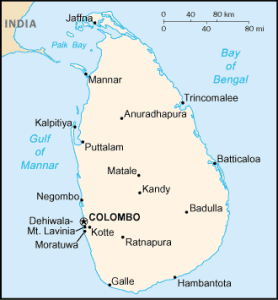- BY Free Movement

Tamil returnee claims torture in Sri Lanka
THANKS FOR READING
Older content is locked

A great deal of time and effort goes into producing the information on Free Movement, become a member of Free Movement to get unlimited access to all articles, and much, much more
TAKE FREE MOVEMENT FURTHER
By becoming a member of Free Movement, you not only support the hard-work that goes into maintaining the website, but get access to premium features;
- Single login for personal use
- FREE downloads of Free Movement ebooks
- Access to all Free Movement blog content
- Access to all our online training materials
- Access to our busy forums
- Downloadable CPD certificates
 UPDATE: the order made by the Upper Tribunal is now available.
UPDATE: the order made by the Upper Tribunal is now available.
A Tamil failed asylum seeker forcibly returned from the United Kingdom to Sri Lanka on 21 February 2012 has claimed that he was tortured on arrival. He was later interviewed by British officials. A medical examination arranged by the British High Commission in Colombo showed fresh abrasions on the man’s legs, where he claims that he was kicked by Sri Lankan officials who were questioning him. The man had several other scars and marks that he said were unrelated to the incident, adding some credibility to the case.
A full description of the incident can be found in a new letter written pre-emptively by Home Office lawyers to an official at the High Court in London in preparation for a number of legal claims made to prevent removals on a charter flight to Sri Lanka scheduled for 28 February 2012 at 3pm. The letter is being relied on in Home Office efforts to discredit the claims of torture of returned failed asylum seekers made most recently at the weekend by New York based monitoring body Human Rights Watch.
Any physical abuse of a detainee is likely to be deemed at least inhuman and degrading treatment in breach of Article 3 of the European Convention on Human Rights because of the ‘particular vulnerability’ of those in detention: Ribitsch v Austria 18896/91 [1995] ECHR 55 at paragraph 36. Ribitsch is an old case predating the landmark decision in Selmouni v France 25803/94 [1999] ECHR 66. These days abuse of a detainee is more likely to be considered plain torture.
At least one fresh asylum claim is thought to have been heard today, 27 February. The claim was heard in the Upper Tribunal by Judges Storey and Jordan and was rejected. The Home Office letter was produced at this hearing. It is thought likely that other similar fresh claims against removal on the scheduled charter flight will also be rejected.
SHARE


8 responses
The claim that ten injunctions were obtained for LKA charter detainees does not ring true. That said the effect would have been that ten reserves (who were unable to stump up the cash) would have flown instead.
PO
Well, we aren’t lying, and a huge amount of pro bono work went into the charter flight by those concerned.
We as in you too? Forgive the typo, meant to say ring bells. In fairness I havnt spoken to colleagues concerned, who had like wise been doing a huge amount of work, LKA removals are the most resource intensive. The process of moving from the “pause” in enforced removals to a full scale charter operations (which stands up to judicial scrutiny in the majority of cases) had been a significant achievement.
PO
Would it be possible for you to post the full Home Office’s letter concerning RS on the site? Thanks very much freemovement.
I have taken it down on someone’s request as it turns out the letter involved a huge brief of confidentiality on the part of the Home Office and potentially endangered the individual concerned.
Thanks for clarifying freemovement. Does that mean the Charter flight judgment is on its way to the Court of Appeal with a whole load of fresh claim cases in tow?
There are quite a few fresh claims on the basis of the Human Rights Watch report. The cases where injunctions were granted had some additional case-specific dimension, though.